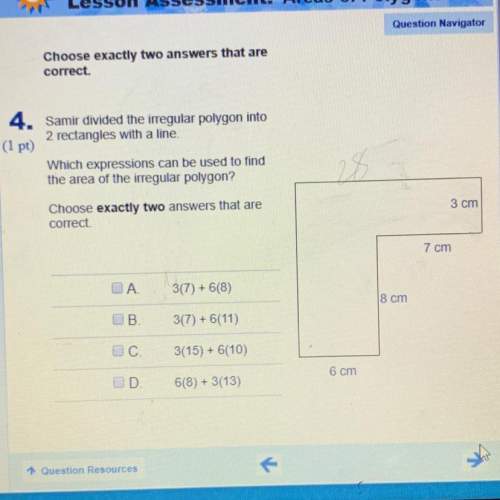
Mathematics, 09.09.2020 04:01 fanta47
If a shark swims swims at a depth of 24.6 meters below sea level. From that depth, the shark rises in the water 7 1/3 meters, the ascends another 14.3 meters. After resting in place for a few seconds, the shark then dives back down 6 5/6 meters. What depth is shark at now?

Answers: 2


Other questions on the subject: Mathematics

Mathematics, 21.06.2019 17:00, datgamer13
Why did the ice arena get so hot after the big game (this is math related google it to find the paper
Answers: 2

Mathematics, 21.06.2019 21:50, spookymod8967
What is the 17th term in the arithmetic sequence in which a6 is 101 and a9 is 83
Answers: 3

Mathematics, 21.06.2019 22:00, LuckyCharms988
What is the solution to the equation e3x=12? round your answer to the nearest hundredth
Answers: 1

Mathematics, 21.06.2019 23:00, kj44
Each of the following data sets has a mean of x = 10. (i) 8 9 10 11 12 (ii) 7 9 10 11 13 (iii) 7 8 10 12 13 (a) without doing any computations, order the data sets according to increasing value of standard deviations. (i), (iii), (ii) (ii), (i), (iii) (iii), (i), (ii) (iii), (ii), (i) (i), (ii), (iii) (ii), (iii), (i) (b) why do you expect the difference in standard deviations between data sets (i) and (ii) to be greater than the difference in standard deviations between data sets (ii) and (iii)? hint: consider how much the data in the respective sets differ from the mean. the data change between data sets (i) and (ii) increased the squared difference îł(x - x)2 by more than data sets (ii) and (iii). the data change between data sets (ii) and (iii) increased the squared difference îł(x - x)2 by more than data sets (i) and (ii). the data change between data sets (i) and (ii) decreased the squared difference îł(x - x)2 by more than data sets (ii) and (iii). none of the above
Answers: 2
You know the right answer?
If a shark swims swims at a depth of 24.6 meters below sea level. From that depth, the shark rises i...
Questions in other subjects:



Mathematics, 16.04.2021 22:30

Health, 16.04.2021 22:30


History, 16.04.2021 22:30

Mathematics, 16.04.2021 22:30

Mathematics, 16.04.2021 22:30






